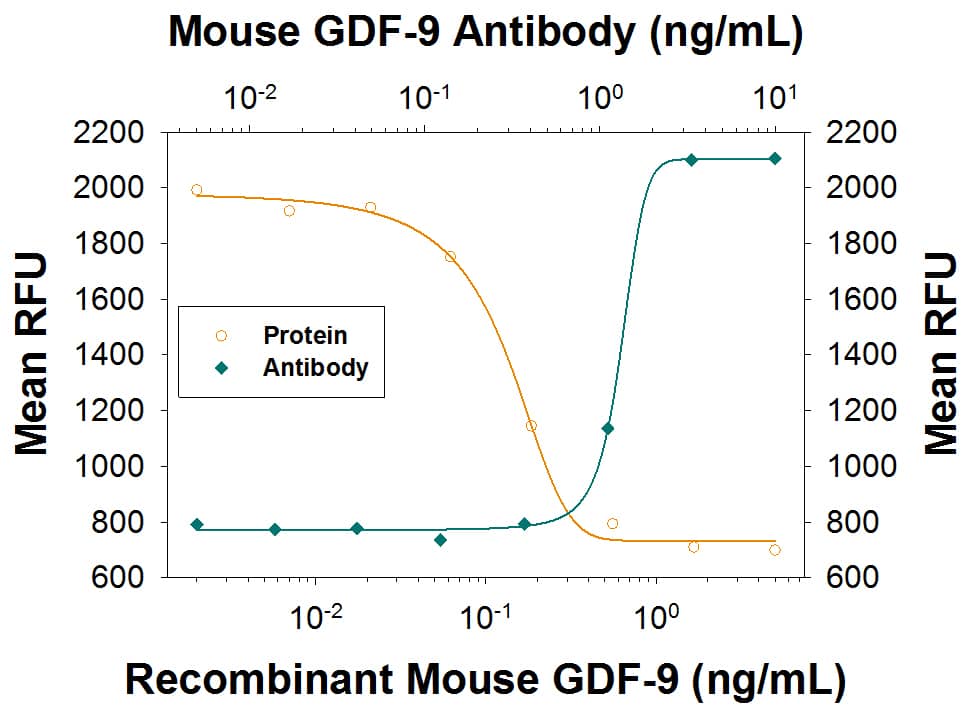Mouse GDF-9 Antibody
R&D Systems, part of Bio-Techne | Catalog # MAB739

Key Product Details
Species Reactivity
Applications
Label
Antibody Source
Product Specifications
Immunogen
Met1-Arg441
Accession # Q07105
Specificity
Clonality
Host
Isotype
Endotoxin Level
Scientific Data Images for Mouse GDF-9 Antibody
Growth Inhibition Induced by GDF‑9 and Neutralization by Mouse GDF‑9 Antibody.
Recombinant Mouse GDF-9 (739-G9) induces growth inhibition in the Mv1Lu mink lung epithelial cell line in the presence of in a dose-dependent manner (orange line), as measured by Resazurin (AR002). Growth Inhibition elicited by Recombinant Mouse GDF-9 (0.5 µg/mL) is neutralized (green line) by increasing concentrations of Rat Anti-Mouse GDF-9 Monoclonal Antibody (Catalog # MAB739). The ND50 is typically 0.4-2.4 µg/mL.Applications for Mouse GDF-9 Antibody
Neutralization
Formulation, Preparation, and Storage
Purification
Reconstitution
Formulation
Shipping
Stability & Storage
- 12 months from date of receipt, -20 to -70 °C as supplied.
- 1 month, 2 to 8 °C under sterile conditions after reconstitution.
- 6 months, -20 to -70 °C under sterile conditions after reconstitution.
Background: GDF-9
Growth differentiation factor-9 (GDF-9) is a member of the transforming growth factor-beta (TGF-beta) superfamily, and is an oocyte secreted paracrine factor essential for mammalian ovarian folliculogenesis (1‑2). Mouse GDF-9 is synthesized as a 441 amino acid (aa) prepropeptide that contains a 29 aa signal sequence, a 277 aa propeptide, and a 135 aa mature chain. Residues 340‑441 constitute a TGF-beta like domain. In addition, there is one potential site of N-linked glycosylation in the mature chain. Unlike other members of the TGF-beta superfamily, GDF-9 lacks the conserved cysteine residue that is believed to form the sole disulfide linkage between subunits in other family members (3). Mature mouse GDF-9 shares 90% aa sequence identity with mature human GDF 9. The protein is expressed throughout the development of the maturing follicle (2). GDF-9 functions as a paracrine factor in the regulation of granulosa cell proliferation and differentiation, and is essential for fertility (2, 4). Studies on GDF-9 null mice have demonstrated arrested follicular development at the primary follicle stage (5). Mouse GDF-9 induces Smad2 phosphorylation and inhibin production in rat diethylstilbestrol treated granulosa cells (6) and in human granulosa-luteal cells (7). The downstream signaling actions of GDF 9 are mediated by the type I receptor, activin receptor-like kinase 5 (ALK5), initiating the subsequent activation of Smad2 and Smad3 (2, 8). GDF 9 uses the BMP type II receptor (BMPRII) as its other signaling receptor (2, 9).
References
- McGrath, S.A. et al. (1995) Mol. Endocrinol. 9:131.
- Mottershead, D.G. et al. (2008) Mol. Cell. Endocrinol. 283:58.
- McPherron, A.C. and S.-J. Lee (1992) J. Biol. Chem. 268:3444.
- Gilchrist, R.B. et al. (2006) J. Cell. Sci. 119:3811.
- Dong, J. et al. (1996) Nature 383:531.
- Roh, J.S. et al. (2003) Endocrinology 144:172.
- Kaivo-Oja, N. et al. (2003) J. Clin. Endocrinol. Metab. 88:755.
- Mazerbourg, S. et al. (2004) Mol. Endocrinol. 18:653.
- Vitt, U.A. et al. (2002) Biol. Reprod. 67:473.
Long Name
Alternate Names
Gene Symbol
UniProt
Additional GDF-9 Products
Product Documents for Mouse GDF-9 Antibody
Product Specific Notices for Mouse GDF-9 Antibody
For research use only
